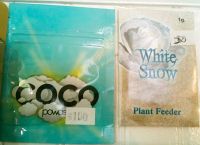Study: Analysis of legal highs
 |
Guess what? According to this recent study in the UK, most legal highs do not contain what they advertise. Piperazines and caffeine are the most common subsances found in fake legal highs marketed as unlabeled research chemicals (what?). Is anyone surprised?
The abstract from the study:
In recent years the availability of so called legal highs over the internet has hugely increased. Numerous online legal high retailers market a broad variety of products which are advertised as research chemicals, bath salts or plant food although clearly intended for human consumption as recreational drug replacements. No guidelines exist as to what is sold and in what purity. Consumers are led to believe that purchased goods are entirely legal.
In this study several legal high products were purchased and analysed for their content. The powdered products were screened with ATR-FTIR followed by GC-MS analysis of methanol extracts. Spectra were compared to reference standards and the NIST library.
Results showed that 6 out of 7 products did not contain the advertised active ingredient. Moreover, five samples contained the controlled substances benzylpiperazine and 1-[3-(trifluoromethyl)phenyl]piperazine combined with caffeine.
[Thanks Sam Hell!]
|

Recently @ DoseNation
|
|






















The comments posted here do not reflect the views of the owners of this site.